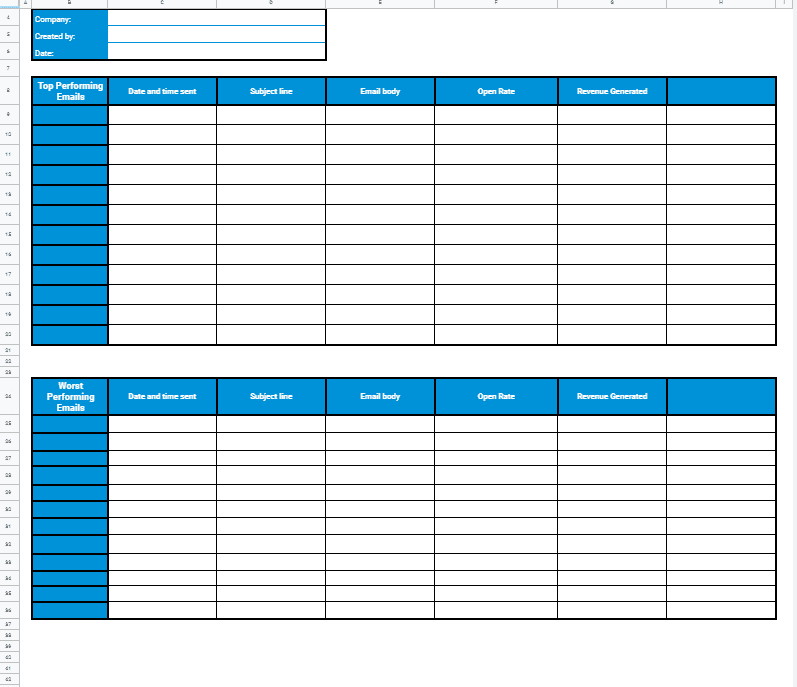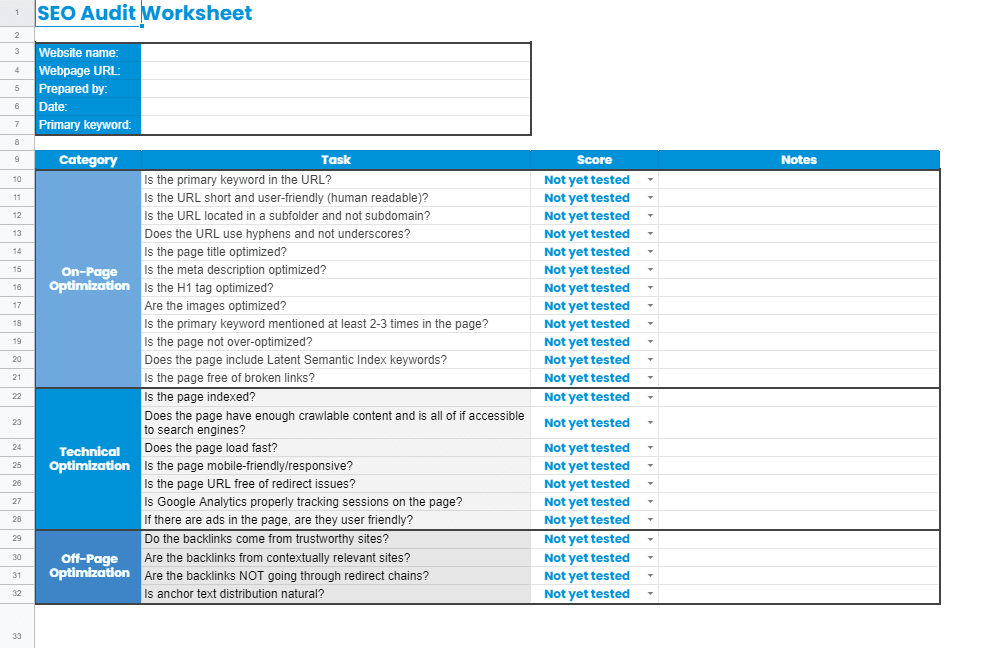Let me know if this one sounds familiar.
You’re doing a little SEO over here, a little paid advertising over there, you have a Pinterest board, a series of automated tweets, and a handful of email marketing campaigns firing off every Monday at 9 am…
… but you have no idea what’s working and what’s not.
If you’re trying to get a grasp of what digital marketing channels are working for your business, you need to audit everything from top to bottom.
Note: The audit process takes plenty of time.
But fear not, fellow Internet marketing nerd. We gotchu.
To make the audit process easier, we’ve created a digital marketing audit template for you and your marketing team, to help audit the heck out of everything you’re doing to increase traffic, leads, and sales to your site, as quickly as possible.
All you have to do is enter your email and download it.
Let’s take a look at what you’re getting when you grab it. Ready? Let’s go!
What is a Digital Marketing Audit?
With a digital marketing audit, you and your marketing team can look at the marketing operations and marketing strategy efforts of your company on different marketing platforms. This digital audit lets you know what works, what does not, and where things can improve. You can also measure the effectiveness of all activities, methods, and marketing channels and look for gaps in those areas.
When performing a digital marketing audit, focus on these areas:
- Website
- Content
- SEO (Search Engine Optimization)
- Digital Branding
- Pay-per-click (PPC)
- Social media
Why Conduct a Digital Marketing Audit?
A digital marketing audit allows you to measure various metrics and identify strategies that can benefit your company and suggest changes in your approach if needed.
Just like any other aspect of a company, your digital strategy should also continually evolve.
For example, in sales, you can’t continue to use the same sales pitch for different clients for a long time. You will have to adjust, re-strategize, and then test out new methods and ideas to see if they can improve your sales. The same is true for digital marketing strategy.
You can assess the strengths and shortcomings of your campaigns by evaluating each component of your digital marketing efforts. Having this data at your fingertips is key to optimizing operations, increasing conversions, and reaching your targets.
By doing a digital marketing audit, you can learn about:
- The ups and downs in the rankings of the website.
- The best-performing keywords for the website.
- The best-performing keywords for the competition.
- The non-performing keywords for the website.
- New keywords which might benefit the website.
With this information, you can find what channels work the best, and create a strategy to create the result you’re looking for.
How Do You Perform a Digital Marketing Audit?
Approach your audit like a detective! The audit you perform must be thorough and inquisitive. Make sure to include data, evidence, and examples that show the digital footprint of your business.
Every digital marketing channel including online performances, assets, competitor performances, and optimization opportunities should be included in the audit.
Every business (small business or a well-established business) has its own set of objectives, so you have to create a customized template for a digital marketing audit depending on your business goals or marketing goals. You can use our digital marketing audit template to cover all these areas.
Here are some elements your digital marketing audit template should include:
1. Website Audit:
Your website is the main point of conversion for your online business – it is where new visitors are converted into customers. Your website audit should improve user experience, rank your website high in Google or any other search engine, and find whether your marketing messages are converting or not.
When a visitor comes to your website, they want to learn about the brand and your services to make an informed decision. That’s why the main pages of your website must be monitored and updated regularly.
For example, prioritize the About Us and Product & Service Pages. The About Us page lets customers know about your brand, and the Products & Service Page explains your services.
A good website allows visitors to quickly get the information they need and get what they came for. Your website must provide an excellent user experience, must be responsive, and fit correctly on all platforms. It should have an intuitive navigation bar that is easy to use and understand and keep your visitors engaged.
2. Email Marketing Audit:
Emails are the most effective way to build your audience and communicate with them!
However, to maximize these benefits, you need to make sure your email campaigns are performing well.
Open Rates and Click-Through Rates are the most critical KPIs of every email campaign and individual email (CTR).
If your subject lines are not compelling enough, your emails will have a low open rate. Make sure your email text and design have user-friendly layouts and captivating text for increased click-through rates.
3. SEO Audit:
If you’re using SEO to generate organic traffic to your website, you must do SEO audits to further increase your website traffic.
For a good SEO audit, here are five major steps:
- Ensure there are no indexing issues on Google.
- Analyze your organic traffic.
- Check the rankings of your inherent keywords.
- Do a backlink analysis.
- Check the website’s on-page SEO and technical SEO.
4. SEM Audit:
While SEO produces results, it can take some time. If you want immediate results, then Search Engine Marketing (SEM) comes in.
Here are five audit measures to tailor your SEM campaigns to your business needs:
- Audit your campaigns.
- Analyze your ad schedules.
- Investigate your bidding strategy.
- Scrutinize your pay-per-click ads.
- Check the relevance of your landing pages.
5. Social Media Audit:
channels for reaching your target audience today.
Even a basic social media audit can do wonders and positively impact your social media marketing strategies while helping business owners increase audiences, leads, conversion rates, and sales.
The process of social media audit looks like this:
- Make a list of all your social media channels (Facebook, Instagram, Twitter, LinkedIn, etc).
- Analyze and evaluate the performance metrics of each social media channel.
- Track down the highest performing content.
- Understand your audience.
6. Content Marketing Audit:
One of the most important aspects of any digital marketing strategy is content. Quality content provides value to your audience, resulting in more leads and revenue.
You should look through blogging material, social content, and email content in your content marketing audit.
Below are a few steps to a content marketing audit:
- Scrutinize all your content assets.
- Identify the content winners.
- Scale up the content winners.
- Locate any gaps in the content
7. Brand Consistency Audit:
To make your brand consistent and memorable, make sure all marketing materials, from landing pages to social media platforms, match the brand design.
During a brand consistency audit, these are a few things to keep in mind:
The company’s logo must be consistent across all platforms.
Showcase brand slogans throughout marketing materials to help customers associate the phrase with the business and vice versa.
The color scheme should complement your company’s logo, style, and brand values because they can evoke a particular emotion in the viewers.
8. Return On Investment Audit:
Your digital marketing ROI (return on investment) shows if your marketing activities have created the anticipated effect. It also offers an indication of the value generated by your business.
The following are some indicators to monitor your marketing activities and see if they are helping you achieve your marketing goals and producing the results:
- Every lead gained or obtained has a monetary value, so make sure to record the money spent in the process.
- Evaluating acquisition cost gives the record of leads that turn into sales.
- Conversion metrics by channel reveal where you should spend your advertising budget.
Tools for Conducting a Digital Marketing Audit
There are various free tools available to help you analyze your website performance data and compare it to the company’s key performance indicators (KPIs). Listed below are a few of the most used tools you can use to conduct a digital marketing audit:
Google Analytics: Google Analytics can be used for information on how your website receives traffic, how customers interact with your content, and how to calculate ROI.
Google Search Console: For tracking and resolving the organic visibility of your website in Google search results.
Google Keyword Planner: For doing keyword research, analyzing search demand, and forecasting.
Besides these tools, you can also use third-party tools such as Ahrefs, SEMRush, SERPwatcher, etc to help you conduct a digital marketing audit.



